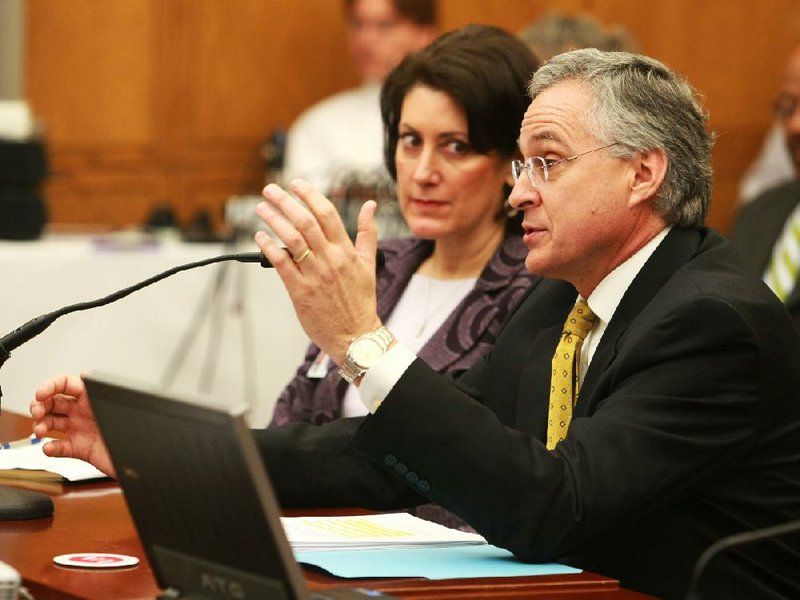LITTLE ROCK — The University of Arkansas for Medical Sciences wants to part ways with its on-site radiation therapy provider, fearing the organization’s newly expanded mission could compete with the teaching hospital’s Rockefeller Cancer Institute.
“It’s a detriment to this whole operation,” said Dr. Peter Emanuel, the institute’s director. “Our missions don’t jibe with each other anymore.”
But removing CARTI, formerly known as the Central Arkansas Radiation Therapy Institute, from UAMS’ campus could come at a high cost — a cost some UAMS leaders are willing to pay to quickly part ways. Because of the uncer- tainty about its future on the campus, CARTI, which provides radiation therapy at eight sites around the state, hasn’t replaced any of its three radiation therapy machines at UAMS recently, Emanuel said. And UAMS can’t make equipment upgrades of its own until it is certain that the University of Arkansas System board of trustees will approve a deal to take over CARTI’s equipment at UAMS and buy out CARTI’s on-site agreement, he said.
While the two struggle to negotiate a deal, those machines continue to periodically break down, creating delays for cancer patients in need of treatment and scheduling frustrations for employees, Emanuel said.
“The individuals caught in the crunch are the patients,” he said.
CARTI’s board chairman told the UA System trustees, who were meeting Thursday and Friday in Little Rock, that her organization was seeking to protect both parties’ interests in negotiating a deal while also ensuring that patients can continue to receive treatment.
At issue is a $5 million difference between the two organizations’ estimates of what the breakup should cost.
And difficulties reaching a deal could lead to legal action, including an effort to vacate the arrangement through eminent domain, UA trustees said.
In a February letter to UAMS Chancellor Dr. Dan Rahn, CARTI offered to vacate the remaining 15 years on its UAMS contract and turn over its on-site assets to the hospital for $10.4 million in an offer that expired today.
Trustees won a last-minute extension Friday, giving them until April 30 to accept the agreement.
That extension came after UAMS leaders told the trustees that their independent specialists estimated that the deal was worth about $5 million.
Trustees called the contract unfair because UAMS’ 2001 agreement with CARTI includes a noncompete clause that applies only to the hospital.
Under the pact, UAMS can’t offer its own radiation therapy on campus, but CARTI is free to offer a full range of cancer services that compete with UAMS, trustee John Goodson of Texarkana said Thursday.
In August, CARTI announced plans to build a comprehensive cancer center in central Arkansas using some assets it bought from Little Rock Hematology and Oncology, a private-practice group.
“They’re trying to shake us down for an excess of $5 million,” Goodson said. “That’s concerning to me.” Trustee John Tyson of Springdale agreed. “Basically, we’ve had our hats handed to us,” he said. CARTI board Chairman Karen Flake told trustees that her organization’s relationship with UAMS was “stressful.”
CARTI considers $10.4 million a fair offer, she said. The organization originally estimated the value of its UAMS assets at about $14 million, Flake said.
“We have noncompete agreements on every campus,” she said, listing other places CARTI operates. “We’re not here to make trouble, and we’re not here to be greedy.”
Flake said CARTI has attempted to replace its three machines at UAMS in the past, but it has not reached an agreement about how to do so.
“We’ve gone forward and we’ve tried to be a partner all along the way,” she said.
The amount of downtime the machines rack up is less than the national average for radiation providers, Flake said.
Rahn agreed that no patient treatment had been hindered by the arrangement, but he said the machines could cause greater difficulty if they are not replaced soon.
UAMS leaders agreed to the $10.4 million deal in February, pending approval by trustees. They plan to replace CARTI’s three machines at a cost of $10 million.
But the arrangement met resistance from the trustees Thursday when they learned of a memorandum of understanding CARTI sent to UAMS on Tuesday. That letter added a stipulation that CARTI must have the right of first refusal if UAMS decides to contract out on-site radiation therapy any time in the next 15 years.
“One day, you asked for a divorce,” trustee Mark Waldrip of Moro told Flake, “and now, if we want a new girlfriend, you would like to approve of her.”
Flake objected, saying “UAMS wants the divorce.”
“We’re just looking out for ourselves,” she said. “It’s kind of like we don’t want the new spouse to get all the alimony.”
Trustee Ben Hyneman of Jonesboro suggested that it may be worth paying the $10.4 million to ensure a smooth transition and a quick resolution to the situation.
“It gives us a certainty that we’re trying to find at a cost I think we can live with,” he said.
But others, including Tyson and Goodson, asked UA System attorney Fred Harrison to determine whether UAMS can use its eminentdomain authority as a public entity to end the agreement.
Harrison suggested the two parties could also seek third-party mediation if they can’t negotiate a deal on their own.
UAMS officials will continue negotiations with CARTI, and the trustees plan to hold a special meeting in April to approve any agreement the two parties reach.
Front Section, Pages 1 on 03/31/2012
